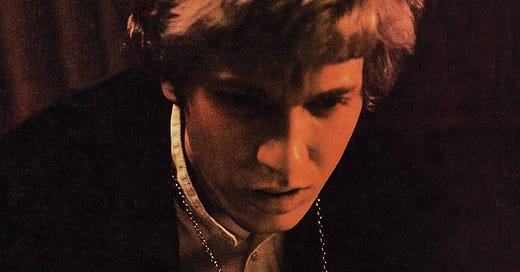And I keep it burning, with hands of desire.
Scott Walker - 'Rhymes of Goodbye' (Scott 4 - 1969)
Scott Walker’s Scott 4, initially released in 1969, is his high-water mark for me. It is a masterpiece that is often cited by others as the pinnacle of his artistic ambition and songwriting prowess. Closing this magnificent album is 'Rhymes of Goodbye', a deceptively gentle, short though moving farewell stuffed with melancholy and poetic introspection.
Last month, I was lucky enough to see Beck at the Royal Albert Hall in London. Much like his LA shows in the summer of 2024, this was something a little different , an orchestra accompanied some of his more string-laden songs, and he included a few well-chosen covers, among them this one from Walker.
Throughout Scott 4, Walker weaves together grand orchestration, existential lyricism, and subtle storytelling into a well-wrought tapestry. Yet in ‘Rhymes of Goodbye’, he pares things right back, revealing something quieter and no less powerful. Its simplicity accentuates its emotional depth, a poignant counterpoint to the lushness found elsewhere on the record. Driven by acoustic guitar and soft, textured strings, the arrangement conveys weary resignation - a quiet, contemplative conclusion to a deeply reflective work.
The lyrics chime with gentle sorrow. Walker’s voice, rich and resonant yet restrained, delivers lines that speak of endings, departures, and the passage of time. He opens with:
I've come far from chains, from metal and stone.
I take this as a potent metaphor: liberation from life’s burdens, but also an acknowledgement of the emotional toll such freedom extracts. Walker’s nuanced delivery transforms simple words into profound meditations. Coming far can mean distance, but it can also mean growth through moving forward, or inward.
When Scott 4 was released, it was met with commercial indifference, largely overlooked by both critics and the public. Ironically, this rejection only intensified its legacy. In the decades since, it’s become a cult classic and, again in my view, Walker’s defining artistic statement.
He remains an enigmatic figure. His evolution from teen idol with The Walker Brothers to avant-garde pioneer speaks to a restless, uncompromising spirit. Scott 4 was a turning point, marking his retreat from commercial concerns and a more profound commitment to experimentation. Yet even amidst the album’s ambition, ‘Rhymes of Goodbye’ is striking for its emotional transparency. It doesn’t feel like a grand finale. It is more like a whispered farewell, lingering in the listener’s consciousness.
Walker’s influence has only grown over time, recognised by generations of artists drawn to his visionary approach. His music wrestled with existential dread, emotional distance, and the fragility of connection, themes that remain strikingly relevant. In "Rhymes of Goodbye", these ideas crystallise into something quietly devastating - a bittersweet acknowledgement of life’s transience.
Today, Scott 4 is revered not just for its musical innovation but for its emotional honesty. Revisiting ‘Rhymes of Goodbye’ reminds us that farewells, while painful, can also be disarmingly beautiful.





Those 4 Scott albums - and the first side of Til The Band Comes In to a slightly lesser degree - are landmarks in the growing up of pop music. I can remember being introduced to Scotts 60s work during Britpop, around the time he was promoting Tilt - which, like his other later more experimental albums, i just can't get into - and being blown away.